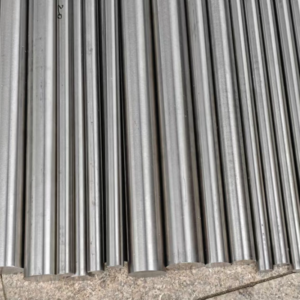Get in touch with us
Leave a message
Monel Rod stands as the ultimate defender against harsh marine and chemical environments. This remarkable nickel-copper alloy combines superior strength with exceptional corrosion resistance – particularly in seawater and aggressive chemical solutions. The unique Ni-Cu alloy composition delivers reliability where other materials fail. Monel Rod maintains its integrity from chemical processing to marine engineering under extreme conditions. Our precision-controlled Monel alloy formulations ensure consistent performance in your most demanding corrosion-resistant alloy applications.

Monel Rod is governed by standards like ASTM B164, B865, and ASME SB164, ensuring quality across grades such as Monel 400, Monel K-500, and Monel R-405. These standards define properties like corrosion resistance, diameter, and finish. For instance, Monel 400 Rod aligns with ASTM B164 for general use, while Monel K-500 offers superior strength and corrosion resistance per the same spec. Classification splits into types such as Monel 400 (nickel-copper alloy) and Monel K-500 (age-hardenable), with grades further distinguished by finishes like bright polished or mill finish. Monel Rod, typically available in diameters ranging from 0.125″ (3.18mm) and above, adheres to similar standards but is often tailored for high-temperature and marine applications.
Monel Rod comes in a wide range of sizes to suit diverse needs. Common dimensions include:
This flexibility ensures Monel Rod fits everything from small fabrications to large industrial builds.
Monel Rod comes in various forms and finishes, each tied to specific manufacturing processes:
| Grade | Characteristics | Applications |
|---|---|---|
| Monel 400 Round Bar | Excellent corrosion resistance (especially in marine and acidic environments). Good formability and weldability. Non-magnetic. Moderate strength. | Marine components (e.g., seawater piping, fittings). Chemical processing equipment. Oil and gas industry. Heat exchangers. |
| Monel K500 Bar | Superior corrosion resistance and strength (due to age-hardening). High durability and hardness. Non-magnetic. Excellent resistance to stress corrosion cracking. | Marine shafts and pump components. Oil and gas valves. Aerospace fasteners. Chemical processing plants. |
A: Monel Rod, typically Monel 400, is used in marine engineering for propeller shafts, chemical processing for pump shafts, and oil and gas for valve stems. Its corrosion resistance makes it ideal for harsh environments like saltwater and acidic conditions.
A: Monel Rod outperforms Hastelloy Rod in seawater corrosion resistance and is more cost-effective for marine use. However, Hastelloy excels in highly acidic or high-temperature environments, making the choice application-specific.
A: Yes, alloy 400 is the most common grade of Monel, a nickel-copper alloy known for its strength and corrosion resistance. Monel Rod made from alloy 400 shares these properties, widely used in industrial applications.
A: Monel Rod can be welded using TIG or MIG methods with Monel 60 filler metal. Inert gas shielding (e.g., argon) is essential to prevent oxidation, ensuring strong, corrosion-resistant welds for structural integrity.
A: Use Monel Rod in corrosive environments like marine settings, chemical plants, or oil refineries where resistance to saltwater, acids, and alkalis is critical. It’s also suitable for high-strength applications up to 550°C.
A: Monel Rod is highly corrosion-resistant, especially in seawater and mild acids, due to its nickel-copper composition. However, it may corrode in highly oxidizing acids (e.g., nitric acid) or under extreme conditions without proper care.

Professional manufacturer of premium specialty alloys, offering stainless steel, Hastelloy, nickel-based alloys and processing services. Delivering superior metallurgical solutions for aerospace, petrochemical, marine engineering and other demanding industries.